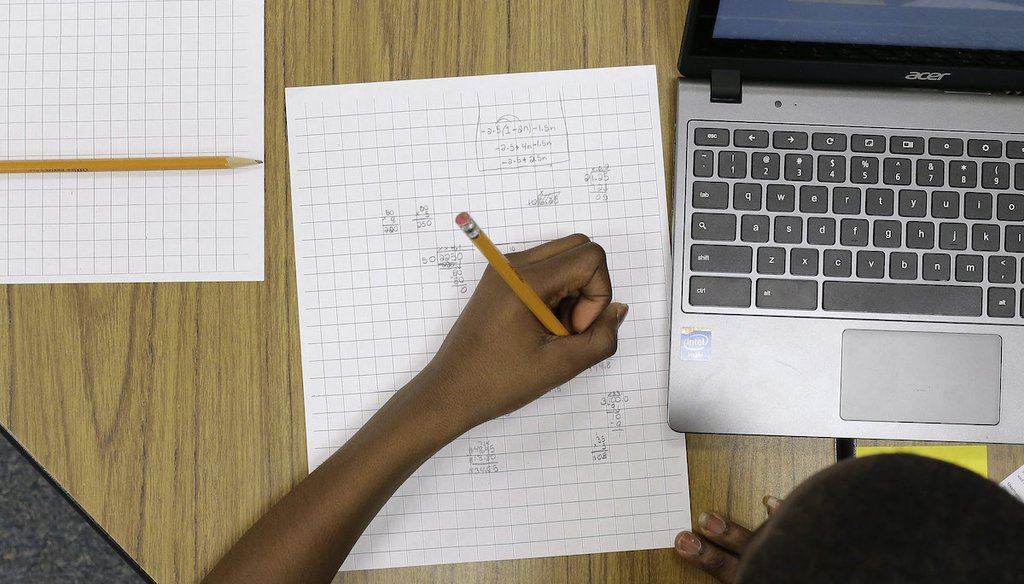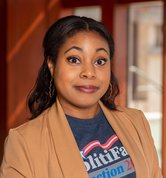Stand up for the facts!
Our only agenda is to publish the truth so you can be an informed participant in democracy.
We need your help.
I would like to contribute

A student at Annapolis Middle School in Annapolis, Md., works on math equations during a test, in this Feb. 15, 2015, file photo. (AP)
If Your Time is short
-
A worksheet more than 10 years old fused algebra with a story about surviving sexual abuse.
-
The Ohio teacher who created the worksheet posted it on his online classroom materials store, but pulled it down after it drew criticism.
-
After Florida rejected a number of math textbooks for use in public schools, Gov. Ron DeSantis’ press secretary defended the move and cited the worksheet as an example of critical race theory being snuck into math lessons.
-
The worksheet was not included in any of the rejected textbooks, nor does it advance the themes of critical race theory.
When Clint Clark joined the staff of Columbus International High School in Ohio as a 24-year-old math teacher and seminar coordinator in 2010, he knew it wasn’t going to be a traditional classroom experience.
The high school, which had just opened that year, focused on diversity and international studies. Amid more traditional course offerings like English, algebra and physics, students might also find themselves exploring how hip hop is employed in political protests or analyzing the use of the death penalty in different criminal cases.
One of the courses Clark taught was called "international seminar," one of several with that title that were designed to be focused on global topics. It was in that framework that he designed a course that aimed to bring awareness to international issues of human trafficking and sexual abuse. As a teacher who also taught algebra, he integrated math into the course material.
He had no idea that 12 years later one worksheet he would create for this class would be held up by political leaders as an example of subversion in public education.
The worksheet he created focused on the biography of writer and poet Maya Angelou. Called a person puzzle, it included multiple choice questions about Angelou’s life, including her history as a survivor of sexual abuse. It quizzed students about where Angelou was born (St. Louis), what her real first name was (Marguerite) and where she taught (Wake Forest University). One question relayed that, as a child, Angelou had been assaulted by her mother’s boyfriend, an experience that, it said, "shaped her career choices and motivation for writing." Another said that, as an adult, she had worked as a "pimp, prostitute and nightclub dancer."
The worksheet also detailed Angelou’s triumphs, including co-founding the Organization of African American Unity and receiving over 30 honorary degrees.
While he was a teacher, Clark began selling his created materials on an online store called 21st Century Math Projects, and uploaded the Maya Angelou worksheet to the store.
"I knew that my students benefited from it, and if I could help other people benefit from it too, (and) crack open the door to have a conversation about that stuff, then by all means I thought it was worthwhile," Clark said.
He uploaded the worksheet to his store along with a mature content label, which he provided to PolitiFact: "CAUTION: Mature content is integral to her biography. This is not suggested as homework and if you choose to use it, should be in your classroom where you can control the conversation."
Clark said teachers did download the assignment — but the warning wasn’t heeded. He said he edited the worksheet to remove the offending content in 2014, but the original worksheet surfaced in news coverage in 2017 after a Twitter account shared a picture of it, and reported the assignment had been given to students at Pennridge High School in Pennsylvania. School officials apologized, saying it was not approved by the school district and "contained adult content without a proper context."
Clark removed the Angelou worksheet entirely from his website in 2021. But that didn’t stop it from surfacing publicly again in February 2022, when it was given as an assignment to ninth graders in the Lincoln County R-III school district of Missouri. The district’s superintendent apologized for the material and said it was not district-approved content, but was downloaded from another website that allows teachers to share resources.
Worksheet surfaces as dubious example in Florida textbook debate
When the Florida Department of Education on April 15 announced it had rejected 41% of math instructional materials due to what a press release described as "references to Critical Race Theory (CRT), inclusions of Common Core, and the unsolicited addition of Social Emotional Learning (SEL) in mathematics," the governor’s press secretary responded to critics by tweeting a picture of the Angelou worksheet.
"This is math homework from a public school district in Missouri," Gov. Ron DeSantis press secretary Christina Pushaw wrote April 15. "How does this help kids learn algebra, exactly? No wonder China is winning…So instead of having a hissy fit because (DeSantis) banned CRT math textbooks, ask yourself why CRT is being injected in math instruction to begin with? I promise you, in China kids aren’t learning about pimping in math class."
The example became fodder for online outrage, shared across Facebook and discussed on Twitter and elsewhere.
But there’s no evidence that worksheets such as the one Clark created were included in any of the math instructional materials that were rejected in Florida. And it’s not an example of critical race theory.
The theory is a collection of ideas about systemic bias and privilege that explores racism’s mark on everyday life in the United States, beginning with more than 200 years of human enslavement. Conservative state lawmakers have created bills forbidding educators from teaching anything that gives a negative view of American history that could make students feel guilty for white people’s actions in the past. DeSantis has argued that it teaches "kids to hate their country or to hate each other."
Fifty-four math instructional materials were on the Florida Department of Education’s rejection list. We reached out to the department to ask about what specific content raised objections in the materials but have not gotten a response.
The department has shared on its website cropped pictures of four examples from the textbooks in question. In one, a bar graph illustrated the results of an "implicit association test" that measured racial prejudice among people of different age groups. Another picture that was titled as a lesson on "adding and subtracting polynomials" also referenced this test measuring racial prejudice. It’s not clear if it’s from the same textbook. A third was focused on "social-emotional learning" and said it sought to "build proficiency with social awareness as they practice empathizing with classmates."
The New York Times acquired more examples from the banned textbooks, which they reported mostly included examples of social-emotional learning content. The Tampa Bay Times analyzed the rejected textbooks and similarly noted examples of social-emotional learning concepts. Three books written for teens also included references to what the Tampa Bay Times highlighted as potentially controversial topics such as polling data, climate change or gun violence.
We reached out to each of the publishing companies whose books were listed on the Department of Education’s rejected books’ list. Only one company responded — Macmillan Learning. Marisa Bluestone, communications director for the company, said it had been notified that its high school textbook, Statistics and Probabilities with Applications, which has been used in schools since 2005, "earned a 4.6 out of 5 on Florida’s Subject-Specific Standards Score." The company was appealing and she said she was unable to share more detail.
Clark said that his worksheet hasn’t been integrated into any textbooks. And he disputed the suggestion his worksheet was an illustration of critical race theory.
"If we think that Maya Angelou (lesson) is an example of critical race theory, (the) only reason is because she's Black, right?" he said. "Like there is no other thing in this entire activity that has anything to do with race, other than the fact that she’s Black."
Clark said that in the original setting in which the Angelou worksheet was presented, he found tremendous parental support.
"If they had a daughter, it was paramount in their mind that they wanted them to learn how to be safe and protect themselves in these sorts of situations," Clark said. "And if they had a son, then they were absolutely 100% on board with them understanding the clear lines between what’s a sexual assault, what’s sexual abuse."
Although Clark continues to create and sell curriculum for math, science, world history and language for other teachers to use, he said this worksheet is not among them. But he still offers materials about Angelou’s biography.
Our Sources
Columbus International High School, Course Offerings, accessed April 28, 2022
Archived, TeachersPayTeachers.org Person Puzzle -- Systems with Substitution - Maya Angelou Worksheet, Nov. 7, 2015
Snopes, Did a Teacher Assign Math Homework that Referred to Sexual Assault? Feb. 6, 2018
Springfield News-Sun, High school math homework contains inappropriate questions, Jan 14, 2017
NBC, Bucks County School District Apologizes for Sexual Abuse Math Question on High School Homework Assignment, Jan. 13, 2017
USA Today, Fact check: Missouri students were given math assignment about Maya Angelou's sexual abuse, sex work, April 20, 2022
Twitter post, Feb. 22, 2022
Florida Department of Education press release, Florida Rejects Publishers’ Attempts to Indoctrinate Students, April 15, 2022
Christina Pushaw Twitter post, April 16, 2022
Facebook post, April 18, 2022
Facebook post, April 19, 2022
Facebook post, April 20, 2022
American Faith, Math Assignment in Missouri Teaches Children About Maya Angelou’s Past of Sexual Abuse, Work as Prostitute, April 18, 2022
PolitiFact, What is critical race theory, and why are conservatives blocking it? May 24, 2021
Florida Gov. Ron DeSantis Twitter post, April 24, 2021
Florida Department of Education, Instructional Materials, April 29, 2022
Common Core State Standards Initiative, About the Common Core State Standards, accessed April 26, 2022
National University, Social Emotional Learning (SEL) & Why It Matters for Educators, accessed April 26, 2022
Florida Department of Education, 2021-2022 K-12 Mathematics Instructional Materials Not Recommended List Does Not Meet Criteria, accessed April 21, 2022
Florida Politics, State education officials release examples of ‘impermissible’ materials in math textbooks, April 22, 2022
New York Times, A Look Inside the Textbooks That Florida Rejected, April 22, 2022
Tampa Bay Times, A closer look at Florida’s rejected math textbooks, April 29, 2022
Interview with Clint Clark, former teacher at Columbus International High School, April 22, 2022
Interview with Marisa Bluestone, communications director for Macmillan Learning, April 21, 2022






















